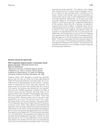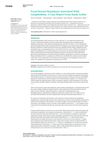
Baricitinib is effective for Alopecia Areata but requires careful patient history evaluation.
 8 citations,
January 2009 in “Journal of pediatric endocrinology & metabolism/Journal of pediatric endocrinology and metabolism”
8 citations,
January 2009 in “Journal of pediatric endocrinology & metabolism/Journal of pediatric endocrinology and metabolism” A specific thyroid hormone resistance mutation may be linked to different types of hair loss.
 June 2024 in “Military medicine”
June 2024 in “Military medicine” JAK inhibitors like baricitinib and ritlecitinib are effective new treatments for severe alopecia areata.
 April 2023 in “International Journal of Research in Dermatology”
April 2023 in “International Journal of Research in Dermatology” Baricitinib is a promising treatment for severe alopecia areata with minimal side effects.
 February 2021 in “Cureus”
February 2021 in “Cureus” A woman's hair loss was initially misdiagnosed as scarring hair loss but was actually a treatable autoimmune hair loss.
 19 citations,
June 2015 in “Seminars in Cutaneous Medicine and Surgery”
19 citations,
June 2015 in “Seminars in Cutaneous Medicine and Surgery” There is no cure for alopecia areata, and treatment success depends on the individual's situation.
7 citations,
February 2020 in “Clinical and Experimental Dermatology” Both HLA-B and MICA are independently linked to alopecia areata.
3 citations,
September 2021 in “JAAD case reports” Denosumab, a bone loss treatment, may cause hair loss and skin reactions due to immune system effects.
 7 citations,
January 2012 in “International Journal of Trichology”
7 citations,
January 2012 in “International Journal of Trichology” Two siblings both had a rare case of alopecia areata at the same time.
 June 2023 in “British journal of dermatology/British journal of dermatology, Supplement”
June 2023 in “British journal of dermatology/British journal of dermatology, Supplement” Congenital alopecia areata may have genetic links and topical corticosteroids are an effective treatment.

A 12-year-old girl in Saudi Arabia with Focal dermal hypoplasia showed skin and dental symptoms, highlighting the condition's variability and the need for personalized treatment.
 January 2010 in “Journal of The American Academy of Dermatology”
January 2010 in “Journal of The American Academy of Dermatology” The document provided instructions for completing a CME exam on diagnosing and managing hair loss.
 4 citations,
April 2022 in “Dermatologic Therapy”
4 citations,
April 2022 in “Dermatologic Therapy” Injecting scalp tissue micrografts is a safe and effective treatment for hair loss after COVID-19.
 May 2015 in “Cancer Research”
May 2015 in “Cancer Research” A new treatment may prevent hair loss from chemotherapy by normalizing scalp cell death and reducing inflammation.
17 citations,
December 2013 in “Journal of Investigative Dermatology Symposium Proceedings” Autoimmune and metabolic issues are linked, and treating one may worsen another.
 33 citations,
December 2005 in “Archives of dermatology”
33 citations,
December 2005 in “Archives of dermatology” Alefacept showed some effectiveness for alopecia areata but needs more research.
 August 2023 in “Research Square (Research Square)”
August 2023 in “Research Square (Research Square)” Melanocytes may trigger the immune response in alopecia areata, affecting hair regrowth.
 53 citations,
January 2014 in “Journal of Cutaneous and Aesthetic Surgery”
53 citations,
January 2014 in “Journal of Cutaneous and Aesthetic Surgery” Microneedling combined with triamcinolone can safely stimulate faster hair regrowth in people with Alopecia Areata.
 1 citations,
April 2023 in “Frontiers in Immunology”
1 citations,
April 2023 in “Frontiers in Immunology” New treatments for hair loss from alopecia areata may include targeting immune cells, using stem cells, balancing gut bacteria, applying fatty acids, and using JAK inhibitors.
 June 2019 in “Journal of evolution of medical and dental sciences”
June 2019 in “Journal of evolution of medical and dental sciences” Dermoscopy is useful for tracking alopecia areata treatment, with yellow dots and new vellus hairs being good indicators of hair regrowth.
 January 2024 in “Dermatology practical & conceptual”
January 2024 in “Dermatology practical & conceptual” Male gender and family history predict alopecia areata recurrence.
 3 citations,
June 2023 in “Journal of cosmetic dermatology”
3 citations,
June 2023 in “Journal of cosmetic dermatology” A new drug, abrocitinib, helped a child with severe hair loss regrow hair.
 March 2024 in “Frontiers in Endocrinology”
March 2024 in “Frontiers in Endocrinology” The study found that alopecia areata and hypothyroidism increase the risk of each other, but androgenetic alopecia and hypothyroidism do not.
 19 citations,
January 2013 in “Journal of Cutaneous Medicine and Surgery”
19 citations,
January 2013 in “Journal of Cutaneous Medicine and Surgery” Alopecia patients struggle with emotions and stress, and improving emotional intelligence may help manage hair loss.
 4 citations,
January 2013 in “Acta dermato-venereologica”
4 citations,
January 2013 in “Acta dermato-venereologica” Some patients with Alopecia Areata experience itch due to immune cells and enzymes that cause itching.
 4 citations,
September 2017 in “Skin appendage disorders”
4 citations,
September 2017 in “Skin appendage disorders” The dog with an Alopecia Areata-like condition showed signs of an autoimmune disease and partially regrew hair without treatment, suggesting dogs could be models for human AA research.
 6 citations,
May 2023 in “Drugs”
6 citations,
May 2023 in “Drugs” Baricitinib helps regrow hair in adults with severe alopecia better than a placebo and is approved for treatment, but long-term effects are still unknown.
 March 2023 in “Photodiagnosis and Photodynamic Therapy”
March 2023 in “Photodiagnosis and Photodynamic Therapy” Low vitamin D levels are linked to severe and active alopecia areata.
 1 citations,
April 2020 in “Baylor University Medical Center Proceedings”
1 citations,
April 2020 in “Baylor University Medical Center Proceedings” Microneedling with triamcinolone helps hair regrowth in ophiasis alopecia areata.
6 citations,
June 2015 in “Journal of theoretical biology” The model showed that immune system guardians and the cytokine interferon-γ are key in alopecia areata progression.


























